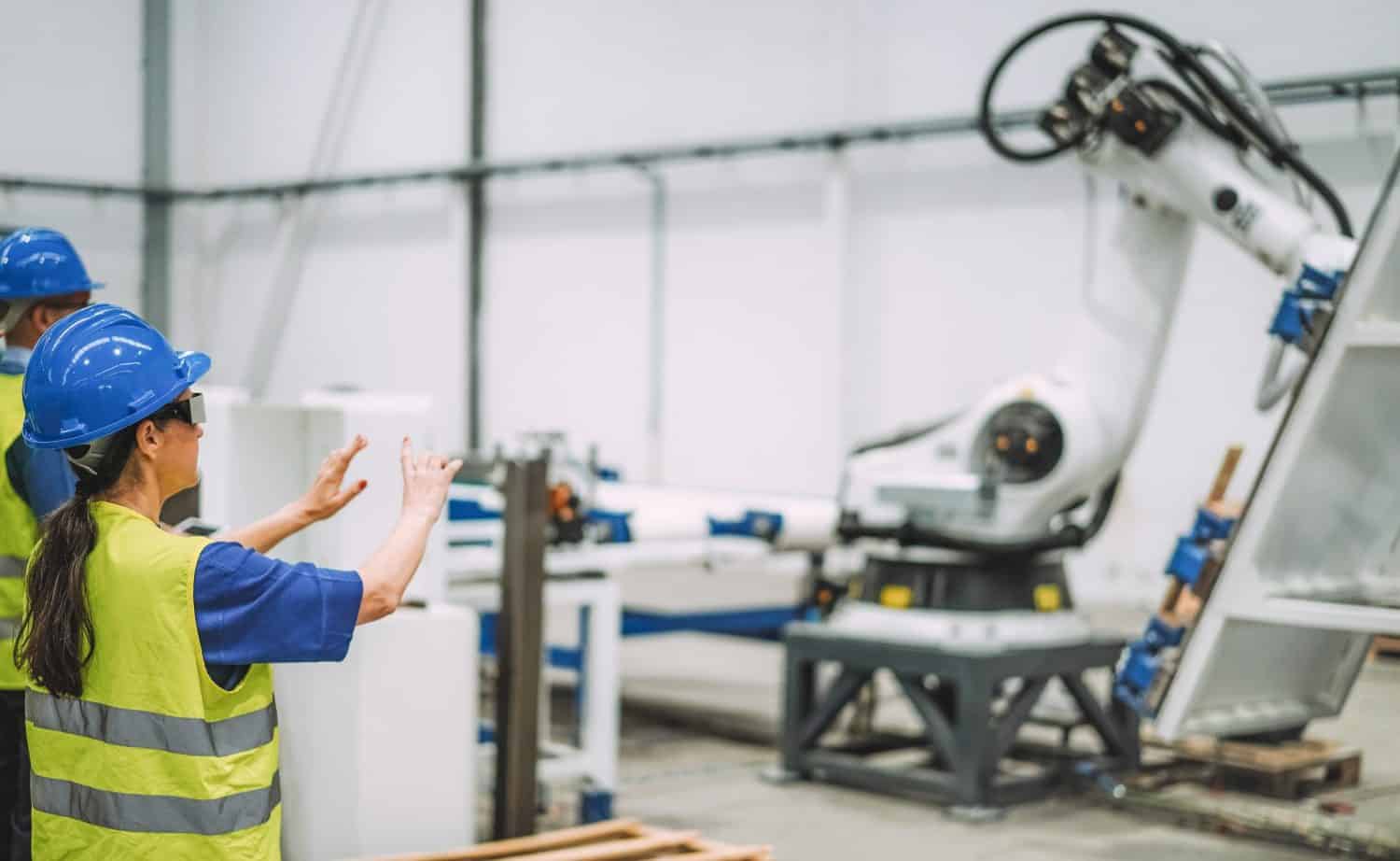
© Golden Dayz/Shutterstock.com
Key Points
- Healthcare: AI enhances diagnostics, drug discovery, and personalized medicine, improving patient outcomes and operational efficiency while reducing costs. Examples include AI-driven imaging tools and precision treatment planning.
- Finance: The finance industry uses AI for fraud detection, algorithmic trading, and customer service automation, enabling more secure and efficient financial operations with tools like predictive analytics.
- Retail and E-commerce: AI powers personalized recommendations, dynamic pricing, and inventory management, optimizing the shopping experience and supply chains for businesses like Amazon and Walmart.
- Transportation and Logistics: From autonomous vehicles to route optimization and warehouse automation, AI improves safety, reduces costs, and enhances sustainability in the logistics sector.
Artificial intelligence (AI) has emerged as one of the most transformative technologies of the 21st century, reshaping industries, revolutionizing processes, and unlocking unprecedented opportunities. As AI continues to advance, its impact on various sectors becomes increasingly evident. Some industries stand to benefit more significantly than others due to their reliance on data, automation potential, and capacity for innovation. Below, we explore the industries poised to gain the most from AI, providing examples and insights into why they are particularly well-positioned to harness its capabilities.
1. Healthcare
Healthcare is one of the most prominent sectors leveraging AI to improve patient outcomes, streamline operations, and reduce costs. The industry’s reliance on data-driven decision-making and the need for precision make it an ideal candidate for AI adoption.

©Golden Dayz/Shutterstock.com
Applications of AI in Healthcare:
- Diagnostics and Imaging: AI algorithms, such as those developed by companies like DeepMind and Zebra Medical Vision, can analyze medical images with accuracy rivaling or even surpassing human radiologists. For instance, AI can detect early signs of diseases like cancer, heart disease, and diabetic retinopathy.
- Personalized Medicine: AI enables the development of tailored treatment plans by analyzing a patient’s genetic information, medical history, and lifestyle. Companies like Tempus are using AI to advance precision medicine.
- Drug Discovery: The process of discovering new drugs is time-consuming and expensive. AI accelerates this by identifying promising drug candidates faster. For example, Insilico Medicine uses AI to design molecules and predict their effectiveness.
- Administrative Tasks: Automating tasks such as patient scheduling, billing, and record keeping reduces administrative burdens and allows healthcare professionals to focus on patient care.
The integration of AI in healthcare improves diagnostic accuracy, enhances treatment options, and optimizes operational efficiency, ultimately saving lives and reducing healthcare costs.
2. Finance
The finance industry has been an early adopter of AI, leveraging it for fraud detection, trading, and customer service. Its reliance on large datasets and the need for real-time decision-making make it a natural fit for AI applications.
Applications of AI in Finance:
- Fraud Detection: AI algorithms analyze transaction patterns to detect anomalies and identify fraudulent activities. Companies like PayPal and Mastercard use AI to safeguard financial transactions.
- Algorithmic Trading: AI-powered trading systems use data and predictive analytics to execute trades at optimal times, maximizing returns. Hedge funds and investment firms, such as Renaissance Technologies, are at the forefront of algorithmic trading.
- Risk Assessment: AI enhances credit scoring and risk assessment by analyzing a broader range of data than traditional methods, enabling more accurate predictions.
- Customer Service: Chatbots and virtual assistants powered by AI provide 24/7 support for customers, answering queries and assisting with account management.
By enhancing security, efficiency, and customer experience, AI is transforming the financial landscape and enabling smarter financial decisions.
3. Retail and E-commerce
The retail and e-commerce industry has been revolutionized by AI, which enables businesses to understand consumer behavior, optimize supply chains, and enhance the shopping experience.
Applications of AI in Retail and E-commerce:
- Personalized Recommendations: Platforms like Amazon and Netflix use AI to analyze user preferences and deliver personalized product or content recommendations.
- Inventory Management: AI forecasts demand and optimizes inventory levels, reducing waste and stockouts. Walmart and other major retailers use AI to manage supply chains effectively.
- Dynamic Pricing: AI algorithms adjust prices in real-time based on demand, competition, and other factors, maximizing revenue and competitiveness.
- Chatbots and Virtual Assistants: AI-powered chatbots provide instant support, helping customers find products, answer queries, and resolve issues.
By leveraging AI, retailers can create highly tailored experiences, improve operational efficiency, and boost customer satisfaction and loyalty.
4. Manufacturing
Manufacturing is undergoing a transformation through the adoption of AI, which enhances productivity, reduces downtime, and drives innovation in production processes.

©Tint Media/Shutterstock.com
Applications of AI in Manufacturing:
- Predictive Maintenance: AI analyzes data from sensors on machinery to predict potential failures and schedule maintenance before breakdowns occur. This reduces downtime and maintenance costs.
- Quality Control: Computer vision systems powered by AI inspect products for defects with greater accuracy and consistency than human inspectors.
- Supply Chain Optimization: AI optimizes production schedules, inventory levels, and logistics, ensuring efficient supply chain operations.
- Automation: Robotics and AI enable automated production lines capable of handling complex tasks with precision.
Companies like Siemens and General Electric are pioneers in applying AI to improve manufacturing processes, leading to higher efficiency and reduced costs.
5. Transportation and Logistics
AI is revolutionizing the transportation and logistics industry by enhancing safety, efficiency, and sustainability. With the rise of autonomous vehicles and intelligent logistics systems, the sector is poised for significant transformation.
Applications of AI in Transportation and Logistics:
- Autonomous Vehicles: Companies like Tesla, Waymo, and Uber are developing self-driving cars and trucks, which promise to reduce accidents, lower transportation costs, and improve fuel efficiency.
- Route Optimization: AI algorithms analyze traffic patterns, weather conditions, and other factors to optimize delivery routes, saving time and fuel. UPS and DHL are leaders in this area.
- Warehouse Automation: AI-powered robots streamline warehouse operations by automating tasks such as picking, packing, and sorting items.
- Predictive Analytics: AI forecasts demand and identifies potential supply chain disruptions, enabling proactive measures.
The adoption of AI in transportation and logistics enhances operational efficiency, reduces environmental impact, and improves customer satisfaction.
6. Education
AI is transforming education by personalizing learning experiences, automating administrative tasks, and providing access to quality education for a wider audience.

©Ground Picture/Shutterstock.com
Applications of AI in Education:
- Personalized Learning: AI platforms like Duolingo and Khan Academy adapt to individual learning styles and pace, providing tailored educational content.
- Tutoring and Assistance: Virtual tutors powered by AI offer instant feedback and support, helping students grasp difficult concepts.
- Administrative Automation: AI streamlines tasks such as grading, scheduling, and attendance tracking, freeing educators to focus on teaching.
- Accessibility: AI-powered tools like text-to-speech and speech-to-text assist students with disabilities, making education more inclusive.
By leveraging AI, the education sector can provide more engaging, effective, and accessible learning experiences.
7. Agriculture
The agriculture industry is increasingly adopting AI to address challenges such as climate change, food security, and resource management.
Applications of AI in Agriculture:
- Precision Farming: AI analyzes data from sensors, drones, and satellites to optimize irrigation, fertilization, and pest control. Companies like John Deere are using AI to enhance crop yields.
- Crop Monitoring: AI-powered drones and computer vision systems monitor crop health and detect diseases or pests early.
- Supply Chain Optimization: AI predicts demand and optimizes the distribution of agricultural products, reducing waste.
- Autonomous Machinery: AI-driven tractors and harvesters automate farming tasks, increasing efficiency.
AI empowers farmers to make data-driven decisions, conserve resources, and improve productivity.
8. Energy
The energy sector is leveraging AI to enhance efficiency, reduce costs, and support the transition to renewable energy sources.
Applications of AI in Energy:
- Smart Grids: AI optimizes the distribution of electricity, balancing supply and demand in real-time.
- Renewable Energy: AI predicts weather patterns to maximize the efficiency of wind and solar energy systems.
- Predictive Maintenance: AI monitors energy infrastructure, such as power plants and pipelines, to identify potential issues before they escalate.
- Energy Consumption Optimization: AI helps businesses and households reduce energy consumption by providing real-time recommendations.
By integrating AI, the energy sector can achieve greater sustainability and operational efficiency.
9. Entertainment and Media
The entertainment and media industry are using AI to create personalized experiences, enhance content production, and engage audiences.
Applications of AI in Entertainment and Media:
- Content Recommendation: Streaming platforms like Spotify and Netflix use AI to suggest content based on user preferences.
- Content Creation: AI tools like OpenAI’s DALL-E and ChatGPT assist in generating music, scripts, and visual effects.
- Audience Analysis: AI analyzes audience behavior to inform marketing strategies and content development.
- Gaming: AI enhances video games by creating intelligent non-player characters (NPCs) and enabling dynamic storytelling.
AI is transforming how content is created, distributed, and consumed, leading to more engaging and personalized experiences.
Similar Concepts
Want to learn more about AI and its impact on industry? Here are three interesting articles describing the impact across industries, how AI has been used to innovate and the ethical challenges of implementing AI.
- This first article describes the implementation of AI across industries.
- This next article provides some case studies on how AI has been used to innovate businesses.
- The final article discusses the ethical challenges of adopting AI in the workplace.
Wrapping it Up
AI is reshaping industries by unlocking new possibilities, enhancing efficiency, and driving innovation. While healthcare, finance, retail, manufacturing, transportation, education, agriculture, energy, and entertainment stand out as the industries benefiting the most, the impact of AI is not confined to these sectors alone. As AI technology continues to evolve, its potential applications will expand, creating opportunities across the economy. Organizations that embrace AI and adapt to its transformative power will be well-positioned to thrive in the rapidly changing landscape of the future.
The image featured at the top of this post is ©Golden Dayz/Shutterstock.com.